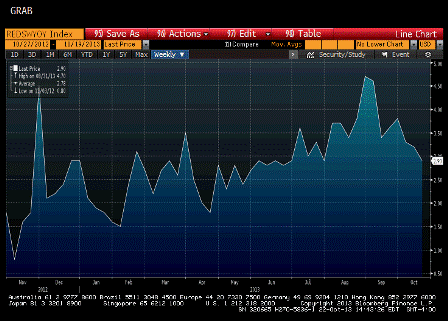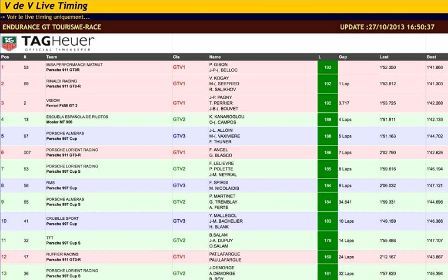Consumer Credit
Category Archives: Uncategorized
real pce yoy
the resilient consumer
total October car sales down a bit
Spain emerges from 2-year recession
Yes, but the output gap continues to widen until GDP growth exceeds productivity gains until then it’s the old ‘good for stocks, bad for people’ thing
Spain emerges from 2-year recession
By Holly Ellyatt
October 29 (Bloomberg) — Spain’s economy emerged from a two-year recession in the third quarter, according to preliminary data released on Wednesday.
Spain’s gross domestic product (GDP) grew 0.1 percent in the third quarter, the data released by the country’s statistics agency showed, in line with forecasts by analysts polled by Reuters.
Barack Obama mounts big push to bolster FDI in US
FDI is a function of employment. Note how high it was when unemployment was lowest. It’s about being able to make money here and not that we actually need fdi for anything, as we can instead relax fiscal
Barack Obama mounts big push to bolster FDI in US
By James Politi
October 27 (FT) — President Barack Obama wants to attract more foreign investment in the US
President Barack Obama and his senior cabinet officials are mounting a big push to bolster foreign investment in the US – amid evidence that America is falling behind other countries in the race for global capital.
The move by Mr Obama to pitch America as open for business is more aggressive than usual from the White House, reflecting a growing realisation in Washington that the case for investing in the world’s biggest economy is no longer self-evident.
In 2000, the US held 37 per cent of the worldwide inward stock of foreign investment but by 2012, that share had dwindled to just 17 per cent. The US attracted $166bn in foreign direct investment in 2012, a 28 per cent decline compared with 2011 and slightly below 2010 levels.
This year’s performance could be even weaker, since in the first six months of 2013, the US brought in $66bn in foreign investment, well behind the $84bn of the first half of 2012.
The FDI push comes after this month’s fiscal crisis – involving a 16 day government shutdown and a brush with debt default – that has raised eyebrows around the world about the US ability to manage its economy and caused nervousness in global markets.
Mr Obama and senior figures in his administration will ask foreign investors to shrug off the country’s political paralysis and weak economic recovery this week, when they speak at a conference in Washington, the first of its kind by the commerce department, uniting foreign investors with US economic development agencies and state and local officials.
Jack Lew, the Treasury secretary, John Kerry, the secretary of state, Mike Froman, the US trade representative, and Penny Pritzker, the commerce secretary hosting the event, are poised to speak at the event on Thursday and Friday.
“On the heels of the manufactured crises in Washington, it’s time for folks to come together and focus on doing everything we can to spur growth and create new high-quality jobs,” the White House said on Friday.
The US federal government has generally shied away from any big initiatives to promote foreign investment, leaving that task to states competing with each other for business.
Indeed, the high-profile effort by the Obama administration to lay out a welcome mat for foreign capital marks a reversal after years when Washington took for granted that any investors or companies seeking a global presence could not avoid putting money into the US.
But that reality has changed, with the growth of emerging markets from China to India to Brazil, which has dramatically heightened the competition.
Foreign investment inflows have fallen across many of the countries in the OECD, the Paris based group that aims to promote sustainable growth, but in the US that drop has been more pronounced than the average of advanced economies.
“The administration is focusing on FDI as an economic priority because the US has been losing ground,” says Nancy McLernon, president of the Organization for International Investment, which represents US subsidiaries of foreign companies.
The hard case to make is that the US political act is in order. The way that the US has handled things – on fiscal policy and, frankly, monetary policy – has not exactly been confidence-inspiring – Clay Lowery, Former senior US Treasury official
“I think there is a positive political environment to encourage foreign investment of the likes I have not seen over the past two decades”, she adds
The argument for investing in the US has traditionally been that it enjoys a huge and wealthy consumer market, large and liquid capital markets, and a predictable legal system. The domestic energy boom, driven by shale gas, has added to the country’s attractions.
But otherwise, the country’s competitiveness appears to have taken steps backwards. Its corporate tax system remains a morass, with a top rate of 35 per cent that can be scary to prospective investors, even if they might end up paying less by taking advantage of tax breaks.
The country’s infrastructure is in desperate need of retooling and there are growing fears about the education system’s capacity to develop a well-trained workforce. Moreover, political dysfunction in Washington, laid bare by the 16-day government shutdown and close brush with default , have damaged the case for investment in the US.
“The hard case to make is that the US political act is in order. The way that the US has handled things – on fiscal policy and, frankly, monetary policy – has not exactly been confidence-inspiring,” says Clay Lowery, vice-president at Rock Creek Global Advisers, and a senior US Treasury official under George W Bush.
“If you’re an overseas investor, one of the best things about the US was you always knew what the rules of the road are and we have taken away some of that policy stability,” he says.
Moreover, the country’s desire for foreign investors has been called into question after severe political backlashes to high-profile foreign acquisitions, especially from China and the Middle East.
Typically, foreign investment into America has come mostly from European countries, whose sluggish economies have led to weaker flows into the US. This means another objective for the US is to diversify its sources of foreign investment and attract more from emerging markets.
Mosler wins in Spain
Redbook
While of limited value, this particular indicator not doing so well.
Weekly Redbook Y/Y:

Full size image
Bulgaria fyi
Boehner’s Offer
Just listened to the video several times.
He offered a short term debt ceiling increase in return for discussions on how to reopen the govt.
That way govt stays closed but no default.
So, it seems they’ve decided to use only the passing of the continuing resolution as leverage, at least until the short term debt ceiling extension expires.
The slow motion train wreck continues…

